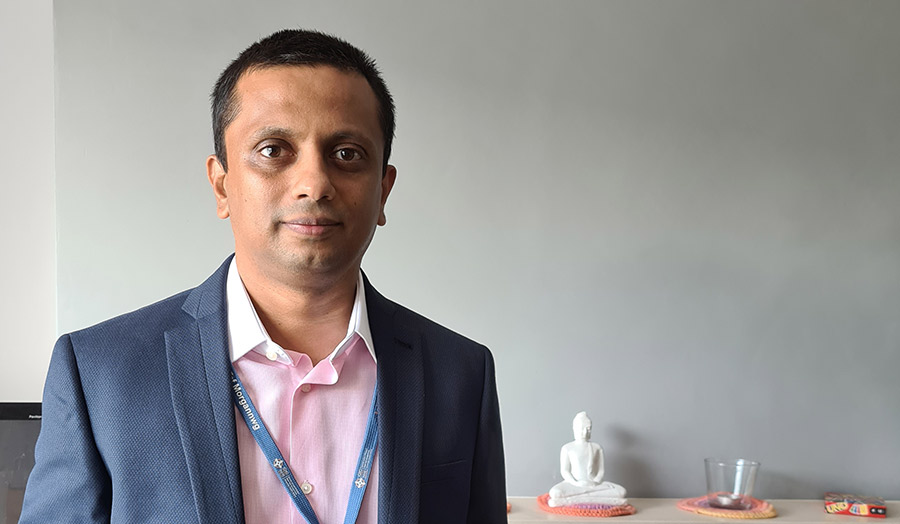Tell us a little bit about yourself.
I grew up in the beautiful city of Kandy in central Sri Lanka. After completing my Advanced Level in biology in 1996, I completed my primary medical degree in 2004. During my internship and subsequent clinical years, I developed an interest in medical administration and chose my career in this field.
I completed my MBA from Cardiff Metropolitan University and an MSc in Medical Administration in 2014. I have been working as a medical director in Sri Lanka ever since then.
What brought you to London Met?
I was looking for a doctoral program after completing my MSc. However, I wanted a professional doctorate rather than an academic doctorate. I chose London Met as it offered me the ideal program.
London Met has good reputation in Sri Lanka as an excellent university – many Sri Lankans have completed their academic programs at London Met and have rated it highly. London Met offers attractive bursaries and scholarships. Many London Met alumni are now in high-ranking jobs. London Met is also in the beautiful and friendly city of London, where you can have a lifetime experience of diversity and equality. London Met has students from all over the world and I loved the experience I had.
What did studying at London Met mean to you?
I did my professional doctorate (Doctor of Business Administration) from 2014 til 2018. It was a three-to-five year program and I was able to complete it in four years. I got excellent support from all the staff at London Met.
Tell us about your current role with the Ministry of Health in Sri Lanka.
I worked for a couple of years after my doctorate in Sri Lanka as a medical administrator. I then moved to UK and am currently working in the NHS. I have worked as a system group director in one of the Welsh health boards. Currently, I am working as a medical appraiser in England as well as my clinical job as a medical doctor.
Can you explain a little more about your research project at London Met?
My research project is on developing an integrated medical appraisal and revalidation system in developing countries like Sri Lanka. It investigated ways to expedite the process while keeping a low-cost approach.
What do you hope will be the real-world impact of your research?
Sri Lanka is at the early stage of developing a revalidation process and the developers have contacted me on discussions around ways to develop the process.
How did you find the research culture at the University?
There was a very supportive environment at London Met. Research is embedded into the London Met culture. It is non-competitive and synergetic. You will get lot of opportunities to present your papers, discuss around the issues and also to solve some of the problems we face whilst conducting our research.
What were the challenges and highlights of the DBA?
My biggest challenge while doing DBA was time. I had limited time as I wanted to finish my DBA in three years rather than in five years. Also, I had to move between Sri Lanka and UK for my research, which was quite difficult due to my social circumstances. I was so lucky as my supervisors were visiting Sri Lanka regularly. They offered me supervision in Sri Lanka which was very convenient for me.
What is your biggest passion in life and where did that passion come from?
My biggest passion is my tendency to question things. I am not 100% sure where it originated – but I feel that it may have stemmed from my religious background of being a Buddhist.
What drives you?
Curiosity about how to make things more effective – especially in healthcare management.
What’s the proudest moment in your life?
Achieving my doctorate and walking on the stage to obtain the degree is the proudest moment of my life.
Tell us a little bit about your interests outside of uni and why they are important to you.
Family is the most important thing in my life. Coming to London Met has given my kids the option to experience in a new world. They enjoyed their time in London.
What’s next in your career?
I am currently working towards becoming a senior healthcare manager in England. I am getting used to the NHS culture and gathering experience so that I can be successful in my career.
Do you have any advice for anyone else considering studying at London Met?
I would 100% recommend London Met as the place of choice for any international student. Coming to a different country for studying is a very stressful event. The atmosphere at London Met is very receptive.The staff were very supportive and flexible with our needs. Everyone at London Met is ready to help and you will feel “homely” at this Uni.

"Research is embedded into the London Met culture. It is non-competitive and synergetic. You will get lot of opportunities to present your papers, discuss around the issues and also to solve some of the problems we face whilst conducting our research."
